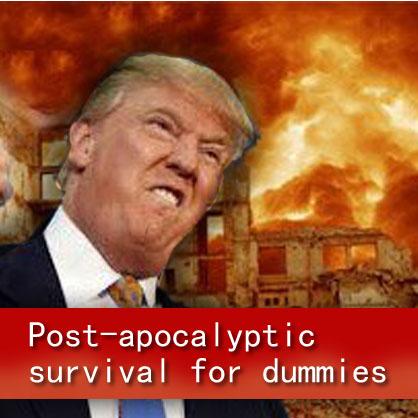Post-apocalyptic survival for dummies by Adam 'Frey' Barczynski
Post-apocalyptic survival for dummies

Since Donald Trump became President Donald Trump there is one question that riddles the greatest minds of our era. Actually there are several questions, like: "how?", "why?", "what his hair are made of?", but there is one that stands out of all those questions. What to do when Trump hits the fan and we all wake up in the post-apocalyptic reality?
03-12-2017 by Adam 'Frey' Barczynski
 Sci-fi One
Sci-fi One
Since Donald Trump became President Donald Trump there is one question that riddles the greatest minds of our era. Actually there are several questions, like: "how?", "why?", "what his hair are made of?", but there is one that stands out of all those questions. What to do when Trump hits the fan and we all wake up in the post-apocalyptic reality? Of course we can wait for the "Survival in post-apocalyptic reality for dummies", but I?m afraid it will be already too late. So we decided, to put together a guide to survival based on the knowledge we have all learned from science fiction movies and video games. Enjoy while it is still a fiction!
Food

Basically in case of post-apocalyptic reality the food should be the first problem - either the agricultural regions are unmanned (no one actually produces food), the food is contaminated (and thus not suitable for eating) or there are no agricultural regions anymore. So basically we are at the beginning stuck with what we can find in the shops. But most of the food has the expiration dates after which there will be no food to eat. Of course except for hamburgers - they are full of chemicals, and will be as good as new even after the next ice age. Other option is hunting, but since we are talking about post-apocalyptic reality there might not be anything to be hunted.
What scifi movies taught us
One things is pretty much certain from scifi movies - the cannibalism is not an option, it is the most sensible solution to food problem (Soylent Green, O-Bi, O-Ba: The End of Civilization), or at least in in the whole process (Waterworld), but apart from that the theme of food is surprisingly absent - even in the middle of the desert (Mad Max) the food simply appears even though there are very few animals that can be hunted and no one seems to be interested in farming.
What scifi games taught us
Games are even more mysterious about the food than the movies - you can simply buy food (Fallout 3, S.T.A.L.K.E.R.), you can hunt animals (Fallout 3), you can even have a stab at farming (Fallout 4), but in most cases we actually never even get hungry (Metro 2033, Transarctica, R.A.G.E.) even though we can find animals breed examples in the game universe (Metro 2033, Transarctica).
Water

Just like food the water is essential to survival and has to be in constant supply. The rivers and lakes might be contaminated, so not much hope there, the groundwaters could be a good solution for a while (until the source of apocalypse won?t reach them), after all you don?t need power to operate some of the wells. Which means that we pretty much do not have any other choice than drink water that isn?t really safe. You know what they say: "what doesn?t kill you makes you stronger", but in that case the water will most likely just kill you.
What scifi movies taught us
Just like in case of the food there are many examples of scifi movies, that simply don?t bother with details like water supplies (Mad Max) or they did signal the problem without explanation (Waterworld, Hell). Yes, you can count on finding water in strange place, but it?s not much of a plan, it?s rather naive approach (Hell). Yes, you can try to turn you urine back into the water, but you would have to drink much more water than you will get from such process.
What scifi games taught us
In games the water is often a strange topic - sometimes it?s too polluted or radiated to be suitable for drinking, but you can buy plenty of alcohol (Fallout 3). Yes, it is true that during middle ages ale was more popular drink than water, because water was of poor quality and fermentation was the way to make it drinkable, but you would need something more than yeast to clear the radiation. Another thing - it takes more than just water and yeast to make alcohol - where do you get other ingredients in post-apocalyptic world? I mean you shop online or ask the shopkeeper next door to deliver them...?
Shelter

Next step after finding a source of food and water is to find shelter that will keep you warm and more or less safe. Since most of the human kind has died that should not be that big problem - it will leave a lot of empty houses and buildings, some of theme perhaps even in good shape, so not much problem there. If everything around would be destroyed you could at least find a lot of debris to use in building a shelter, but since you won?t have enough food or water to probably won?t have enough time to care about the shelter.
What scifi movies taught us
The answer to every apocalypse in the movies seems to be the same - underground shelters (Logan?s Run, O-Bi, O-Ba: The End of Civilization, The Last Train, The Colony, Twelve Monkeys). But what to do when you don?t actually live next door to one? The answer is head east (The Road), head for the mountains (Hell), head north (28 Days Later) or to well known oasis somewhere outside the city (I Am Legend, ). This is the most puzzling bit - the civilization has ended, the we are the last of the survivors, but somehow the information about the miraculously safe place suddenly reaches us in time. How? We just stumbled upon that information? It was written on the wall in the gents or someone tweeted it?
What scifi games taught us
The gaming industry has come up with more creative solution - underground shelters (Fallout 3, Fallout 4), underground stations (Fallout 3, Metro 2033, R.A.G.E.). Oh, wait, they are exactly the same... What is even stranger even after apocalypse we can find a decent buildings completely in tact and ready to be resettled (Fallout 3, Fallout New Vegas, Fallout 4), but still people choose to live in the scrappy huts in the middle of the desert and leave the buildings empty (Fallout 3, Fallout New Vegas, Fallout 4).
Weapons

One thing is pretty certain from post-apocalyptic fiction - the weapons are must-have accessories. After all you will have to hunt (although there might not be anything to hunt for), you have to defend your family (that probably died in the apocalypse anyway) and defend your new home (against people, who just like you don?t have anything). In science fiction weapon equals power, but in post-apocalyptic times it might be just wishful thinking.
What scifi movies taught us
Weapons always play important part in scifi movies since obviously there is always something to fight for - food (The Road), water (Hell), fuel (Mad Max), power (Bunker Palace Hotel), survival (The Colony), knowledge (Cyborg), fun and profit (Ga-Ga Glory to the Heroes, Six-String Samurai). But according to scifi movies you will never get what you want using weapons and brutal force.
What scifi games taught us
Video games puts things in different perspective. There is still plenty to fight for - power (Fallout New Vegas, Metro: Last Light, Road War 2000), survival (Fallout 3), knowledge (Fallout 3, Metro 2033, S.T.A.L.K.E.R., R.A.G.E.), fun and profit (Fallout 4, S.T.A.L.K.E.R.), but contrary to the movies in video games you always get what you want when you use weapons.
Tribes aka factions

Pretty much every author and director assume that after apocalypse the society will move back to the tribal system or rather factions system (which is an odd idea). The assumption is based on the first two points of our guide - food and water supplies became the new wealth, so people will organize in the tribes or factions to win control over them, which actually makes sense... Almost. First of all, as an old saying states, "every army marches on its stomach", which means that every group, tribe, faction or whatever we will call it, would need a food and water sources to even be created. To survive they would need someone to work for them. Yes, a slavery becomes handy in such cases, but to find people who you could force to work for you, you already in need of food and water even to look for them. On the other hand if the food and water supplies are so limited you most probably won?t find sources big enough to support the whole tribe. If they are not so limited, so you could support big group of people then there is no point in creating tribe in the first place.
What scifi movies taught us
Scifi movies usually concentrate on the individuals survival in post-apocalyptic reality (Mad Max, Waterworld, The Road), where rest of the world seems to be organized in settlements, there are very few examples, where tribal system would be implemented within those settlements - when you join the settlements, you join the tribe.
What scifi games taught us
Video games have quite different look on the things - even within settlements you have different factions, which is a bit odd concept. For example take a look at the Fallout 3 or Fallout New Vegas games, where there doesn?t seems to be enough food to go around, but the people are more concerned about being part of Brotherhood of Steel or Brotherhood Outcasts, if they are Great Khans or Boomers. Similar story is with Metro 2033 and Metro: Last Light, where people have split into factions even though their basic survival is still uncertain. They do have time to saw themselves the matching uniforms, but have no time to put up a tent or hut?
Trade

Another interesting assumption of the authors and directors is that after the apocalypse there will be pretty much normal trade going on. Of course money are no longer used as a currency, instead some more or less reasonable products are used or it is simply swapping system. But the whole concept of trade is again based on the assumption that there is something to be traded around - food and water supplies are essential, perhaps weapons, medicines, clothing, tools - they could be traded. And here?s the same problem again - if they are so limited why would anyone consider selling them, if they are not that limited why would anyone consider buying them? Besides trade assume the lines of supply of the merchandise, which means food and water supplies for the caravans, which means that the water and food supplies are not that limited. The supply lines mean costs, they mean people to transport the merchandise, they mean some sort of the devise to transport them... And so on, and so on.
What scifi movies taught us
There were different approaches to this bit of post-apocalyptic reality in the movies, but overall the swapping system is used, in which there is no universal currency, which makes sense - who would decide what is the currency, what are the rates, what is the value of the merchandise. Trade is based on profit margin, with no currency there is no profit margin. Besides same product can be essential for one person and useless for another. Interesting addition was the one presented in Waterworld, where trade is forced by the traditional rules - when two people meet and one wants to trade the other one can?t refused. Unfortunately we never learned what would happen if he would refuse, I guess the water police would track him down afterwards.
What scifi games taught us
This is again where the games have different approach from the movies - in games in general there is always a universal currency, mostly because swapping system would be too complicated for simple games. And that?s how we end up with bottle caps as currency (Fallout), ammo as currency (Metro 2033), coal as currency (Transarctica), which often make very little sense since the currency is something that has almost unlimited supply and simply can be produced without limits. Also in every single game you will find someone to trade with (Fallout, Transarctica, S.T.A.L.K.E.R.), you will find plenty of place to scavenge products you can always sell. But the most amazing bit about this is that some of the thing that should be rare and hard to get (like food, alcohol, ammo, medicines, drugs) are in constant supply without any explanation how did they get here. For example in Fallout games who produces the drugs you are using since there are no pharmacies, no companies that manufacture them, no laboratories, where they could be developed? In S.T.A.L.K.E.R. games you can buy almost any amount of ammunition, but since the Zone is pretty much closed who supplies them in wholesale quantities?
Energy

Energy is one surprising bit of post-apocalyptic reality if you believe movies and games - there is one. Yes, in the world, where everything is destroyed, everyone is dead, the generators, power lines, energy sources have somehow survived. What is more some of the devices that are powered by them will survive fully operational.
What scifi movies taught us
In scifi movies there is usually an emergency generator that survive or electronic device that somehow wasn?t affected by the apocalypse even though the buildings around have collapsed and all human has died. In some cases it is explained by the ice age (10,000 Days), but while low temperature is good for conserving meat it does very little good to electronics. Of course there are underground bunkers that will obviously survive everything (The Colony, Sexmission, The Last Train), but their sources of fuel to produce energy are limited. In some cases (like I Am Legend) the creators simply forgot that energy to reach our sockets have to be first produced in power plant. I doubt that even a day after apocalypse many of the power plant workers would show up for work.
What scifi games taught us
In video games the energy sources are equally vague - there are some miraculously effective power sources that do not require fuel, yet they constantly supply energy even though power lines have been destroyed (many examples in Fallout games). Similar situation is in Metro 2033 - some of the stations have light sources, yet there are no power sources. Even if they have generators where would they get the fuel to supply them since there is no way to survive on the surface?
Bad guys

And this is the last and I think the most surprising bit of post-apocalyptic reality that games and movies are offering us - the roving bad guys. I don?t know how, I don?t know why, but it seems that most of the people to get through the apocalypse are total assholes, who will form a sort of gangs and will start wander around robbing people. On first glance it is about right, when you take a look what happened in New Orleans after Katrina hurricane, but again we return to the same question - how those gangs would survive without water or food supplies? Yes, they would rob the people, they would attack the settlements to get food or water, but what next when there is no one else to be robbed?
What scifi movies taught us
In scifi movies the wandering gangs are almost cliche, f.e. Mad Max, Waterworld, The Book of Eli, there plenty to choose from and in every single one of those examples there is no explanation how do they survive in the post-apocalyptic reality. They get together, they have weapons, they have no food, no water, no slaves, not a single reason to exist, and yet they do. Of course they could steal the supplies from people, but it would always be a risk, not to mention that if the supplies are limited there isn?t enough to steal. Also you have to wander around, waste time and energy on an off-chance to get food or water. The longer the gang exists the more time and energy must spend on searching for their prey since they cause settlements to die out. Of course they can set up traps to lure victims in them, but in post-apocalyptic reality there are very few people just wander around that can be ambushed, so it could be days, weeks or months before such trap would actually work.
What scifi games taught us
In scifi games the situation is almost identical - Fallout 3, Fallout 4, Fallout New Vegas, S.T.A.L.K.E.R., Roadwar 2000, R.A.G.E. and many more - there are always bandits, gangs and generally bad guys that you will stumble upon your journey. And in every one of the games they have no base, no camp, no fort, no place they live, they just wander around with guns and attack people, which makes very little sense. I mean they would not survive a week without source of food, water, ammo, shelter, etc. But in the games they do exists for simple purpose - to make the game interesting - and that?s where their existence ends.
Conclusion

If you are want to use the knowledge from movies and video games to prepare for the apocalypse you need to use a common sense - most likely you will be completely alone, with not enough food, not enough water and you will have to find or build a shelter even to deal with the weather. Aside from the sunlight you will spend your time in the darkness wondering where to get food next day, source of light, warm place to sleep will be your luxuries. Most likely you will have to travel from place to place in order to find something to eat, some tools, some sort of weapons, but not far from water supplies. You will meet some people like you, who are looking for a way to survive. Some of them will be friendly, some of them will be hostile, and if you are lucky you will even find someone you can trust, so not much change there from what we have now. As for movies and games set in the post-apocalyptic reality they do carry small bits of the knowledge you will require, but don?t expect anything like New Vegas to simply pop up as an oasis, your reality will be more likely close to the one you saw in the movies. Well, perhaps there will be less zombies and superheroes around, but there will certainly be far less underground bunkers you could hide in.














